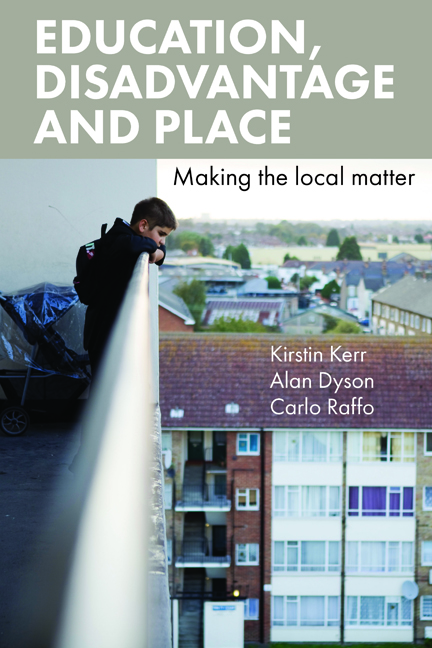Book contents
- Frontmatter
- Contents
- List of tables and figures
- Notes on authors
- Acknowledgements
- one Introduction
- two Why place matters in education
- three Local education systems as products of place: a case study
- four Learning from the past
- five Learning from the present
- six A rationale for a new generation of area-based initiatives
- seven Developing understandings of place as a basis for intervention
- eight Evaluation and monitoring
- nine Governance and accountability
- ten Children and places in hard times: some concluding thoughts
- References
- Index
one - Introduction
Published online by Cambridge University Press: 25 February 2022
- Frontmatter
- Contents
- List of tables and figures
- Notes on authors
- Acknowledgements
- one Introduction
- two Why place matters in education
- three Local education systems as products of place: a case study
- four Learning from the past
- five Learning from the present
- six A rationale for a new generation of area-based initiatives
- seven Developing understandings of place as a basis for intervention
- eight Evaluation and monitoring
- nine Governance and accountability
- ten Children and places in hard times: some concluding thoughts
- References
- Index
Summary
England is, in global terms, an affluent country. Yet, like many other affluent countries, it is characterised by marked inequalities of outcome. Put simply, different individuals enjoy, among other things, different levels of income, educational achievement and health. It may be the case that some of these inequalities are due to individual differences that it is difficult to do much about. However, it is certainly the case that they are also strongly related to individuals’ social characteristics – to social class, ethnicity, gender and disability, among others (Equality and Human Rights Commission, 2010). Through what appear to be complex but powerful processes, these characteristics translate into advantages and disadvantages for individuals in relation to achieving good outcomes. Often, those individuals and groups in the most unpromising circumstances are simply characterised as ‘disadvantaged’, though it is worth remembering that there are likely to be distinctive patterns of advantages and disadvantages in all people's lives.
Historically, policymakers have felt that they can and should do something to tackle inequalities that arise in this way. Anti-poverty strategies, gender and ethnic equality policies, welfare policies, and universal access to high-quality public services are among the many ways in which policymakers have sought to eliminate the disadvantages experienced by different parts of the population. By and large, these policies have been universal in nature, or have been targeted at particular social groups wherever they may live. However, policymakers have also been aware that inequalities have a spatial dimension, that different places are unequal and that some places are characterised by multiple forms of disadvantage. As Tony Blair, the ‘New Labour’ prime minister from 1997 to 2007, observed:
When we came into office, we inherited a country where hundreds of neighbourhoods were scarred by unemployment, educational failure and crime. They had become progressively more cut off from the prosperity and opportunities that most of us take for granted. Communities were breaking down. Public services were failing. People had started to lose hope. (Social Exclusion Unit, 2001, p 5)
Such places are often simply characterised as ‘disadvantaged’ (or, indeed, ‘deprived’ if the emphasis is on limitations in economic and other resources), though, as with individuals, the reality is that advantages and disadvantages form distinctive patterns in each place.
- Type
- Chapter
- Information
- Education, Disadvantage and PlaceMaking the Local Matter, pp. 1 - 30Publisher: Bristol University PressPrint publication year: 2014



